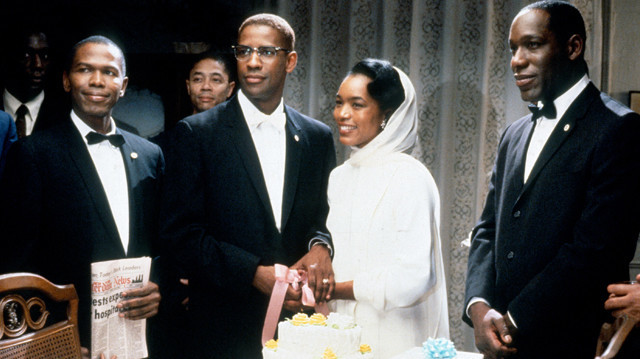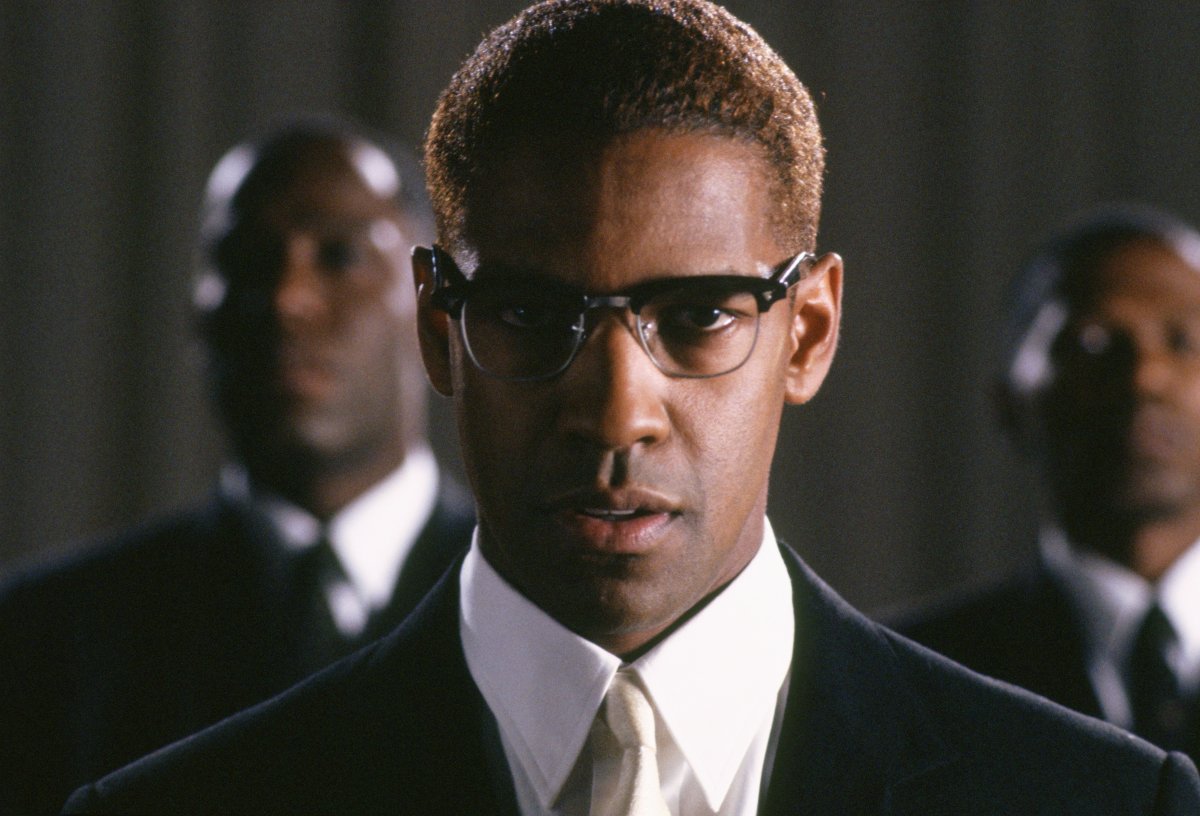We are republishing this piece on the homepage in allegiance with a critical American movement that upholds Black voices. For a growing resource list with information on where you can donate, connect with activists, learn more about the protests, and find anti-racism reading, click here. #BlackLivesMatter.
Having screened Spike Lee’s “Malcolm X” for students for decades, there were two years in which people protested that it was an artifact of a bygone era. In the first two years of Obama’s presidency, students–of middle and upper-middle-class affluence–complained that racism was solved. Now, as Denzel Washington’s performance captivates what seems like a timeless story, those quibbles seem like the artifacts.
The film takes us through the life, death, and resonance of the Black American civil rights icon. He is a son of a Christian preacher, who, inspired by the teachings of Marcus Garvey, called on African Americans to move back to Africa. After his father’s murder, he and his siblings get split into foster care homes. Despite being the top student in his classes, his teacher shuns him because of his Blackness. He enters a life of crime and gets caught. In prison, he gets introduced to the Black separatist teachings of Elijah Muhammad and the Nation of Islam. He transforms into a fiery preacher, growing the young organization into a national force. Then, he discovers that Elijah Muhammad has been fathering children with his secretaries and isolating them. He departs on the Muslim pilgrimage to Mecca to immerse himself among communities of mainstream Muslims while also traveling as a representative before world leaders. Not long after his return, in which he announces his departure from the Nation’s teachings, he embraces a universal outlook while still placing primary focus on African American communities. The Nation, with probable instigation from the CIA or FBI, launches attacks against him, including his assassination.
From its first seconds, the film comes out swinging. Lee’s opening credits are their own works of art, from Rosie Perez dancing in “Do the Right Thing” to soft-focus monochrome close-ups of Denzel Washington and his trumpet launching “Mo’ Better Blues” to street signs floating across Harlem and Brooklyn in “Jungle Fever.” Here, young preacher Malcolm’s raging voiceover charges “the White man with being the greatest” oppressor in various forms of global exploitation. Los Angeles cops swing down onto Rodney King during one of the earliest video recordings of police violence. Terrence Blanchard’s trumpets scream high notes. The American flag burns. You know from the first moments that you will love this movie or hate this movie.
You will, however, love, hate, and love Malcolm. For me, as a young man reading his autobiography, it provided a path I was always looking for. Always a solitary kid consumed by questions I could not answer, I stayed up at night wondering: If we are going to die anyway, what is the point of dreams? Is there more to life in this world than the other option: this cycle of working so you can train your children to work, so they would train their children to work, and so on? The answer is of course “yes,” but Malcolm gave me the completion of the answer: you must fulfill your humanity. A necessary component of the fulfillment of your own humanity is in supporting all others in fulfilling theirs. This pursuit must be relentless.

In his own sometimes unintentional pursuit, Malcolm was a man of many phases. Lee illustrates the changes through his names (Malcolm Little, Red, Satan, Malcolm X, El-Hajj Malik El-Shabazz), through changes in his grooming (natural hair, conk, close trim, beard) and his clothing (greys and browns with faded suspenders, bright zoot suits, double-breasted suits with wide lapels and tall handkerchiefs, prison blues, classic slim dark business suits with starched white shirts and glasses, Muslim pilgrimage garb). The most apparent, however, is the evolution of men and women in his life. Fearless mentors nurture him: his strong, powerful preacher father, the mathematical genius con artist West Indian Archie, the ultra-serious Baines, and the demagogue that launched a massive social reorientation, Elijah Muhammad. His loves—his mother, Laura, Sophia, Betty, daughters—represent different loves: maternal, innocent, forbidden lust, partnership, and dreams of nurture.
In Stanley Kubrick’s “2001: A Space Odyssey,” every time the tall rectangular monolith appears, the world leaps forward in progress, from monkeys around a pond to humans operating robots. Here, each mentor propels Malcolm toward the next, until he is without a guide, a Ronin. It is as though each experience is a cocoon in which one version of Malcolm squeezes his way to the next cocoon. Then, he faces the Divine as a pilgrim, alone in a giant crowd. “It was the only time in my life I stood before the Creator of all and felt like a complete human being.” Soon after, the Divine reclaims him.
Through vignettes, Lee touches on numerous issues in social consciousness that were relevant not only during Malcolm’s life but also during the 1992 film’s release, and today. It is as though Malcolm’s story is Lee’s sermon about the state of African American life. Omnipresent police, brutal when present, yet absent when needed. The destruction of the African American family. Gangsters living out macho fantasies. The vulnerability of a Black man against a White woman’s accusations. Society’s devouring of talented African American men and women. Lottery schemes that to bystanders look like mere gambling but hold different meanings of hope to those whose financial backs are against the wall. Most of all, the pervasive violence that seizes Black bodies: sometimes the sound of gunshots, sometimes the threat of killing, sometimes Klan lynchings, and ultimately assassination.

It seems that nothing has changed in a century. When I ask young people—even children in 2016 who grew up under an Obama presidency—to describe someone “American,” they unanimously describe someone White. Today, my social media is peppered with a mosaic of faces of dozens of young Black men who have been killed, with their killers seeming to escape consequence. The overarching message is that our system crushes people, especially African Americans. Even though none of us started the system, we—especially members of other communities – are complicit as beneficiaries.
In the past two decades, in my own capacity as a preacher, teacher, and chaplain, I have given over 10,000 talks. I wonder if any of them have had any effect on anyone except me. I have gone through my own minor evolutions, feeling that Malcolm stands like such a tower above me. I am less hopeful today than I was twenty years ago. Yet I do not stop. Stopping is not an option for despair is not an option.
What, then, is the ongoing theme that propelled Malcolm through his many phases? At one level, every American who carries any minority or marginalized identity – any identity that differs from straight White male protestant – tastes a type of oppression in which they must keep molding all aspects of their bodies, minds, and hearts into conformity, in order to recognize themselves as human. Meaning, Malcolm’s mentors compressed him through the cocoons to protect him from this steamroller that is America, to free him from the clutches of this society.
Or, perhaps, he wanted something simpler. Through his various journeys, he was a simple man seeking something simple: peace. He could not find it in his heart until everyone could. This world did not let him have it. It killed him too.












